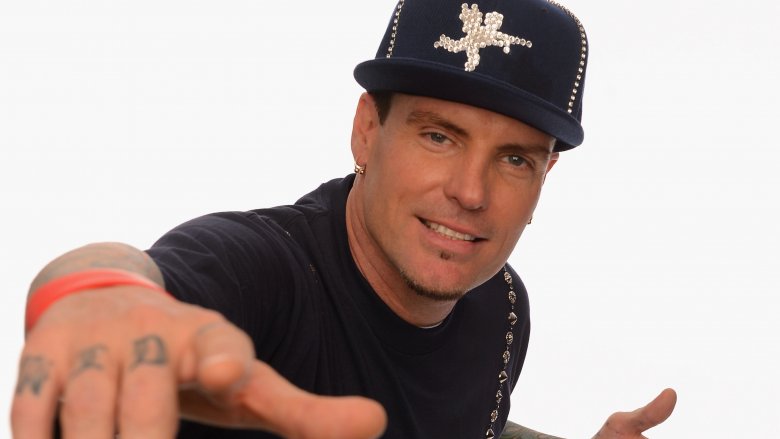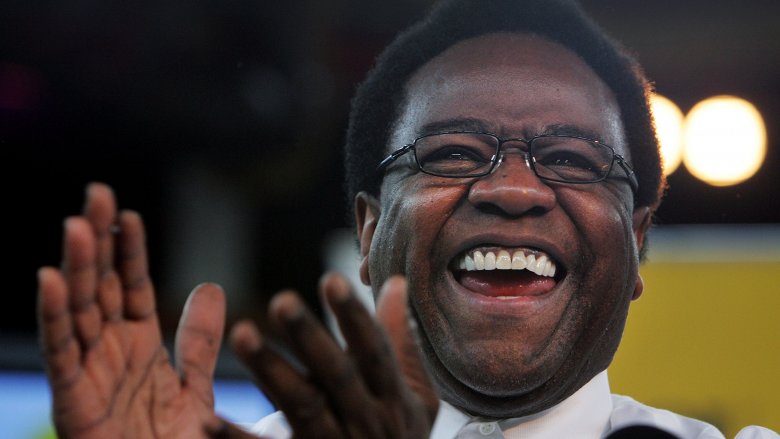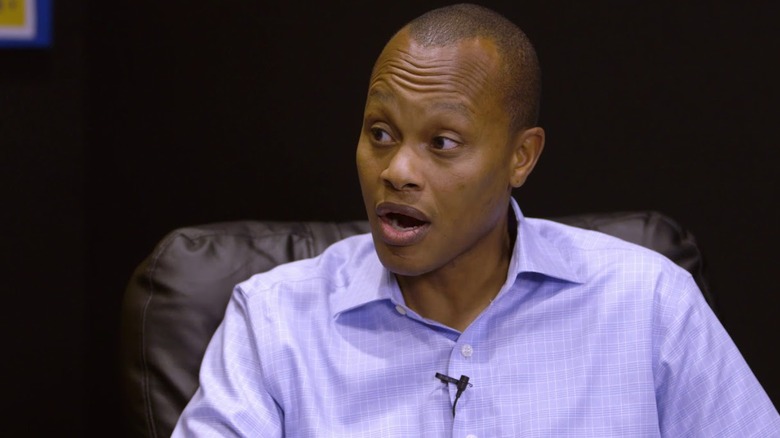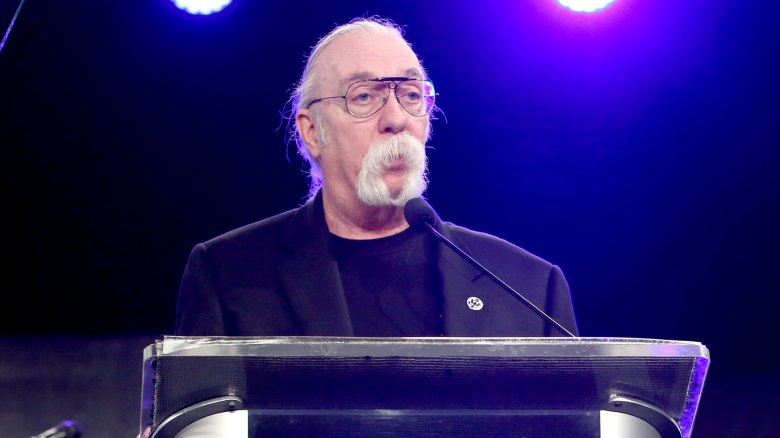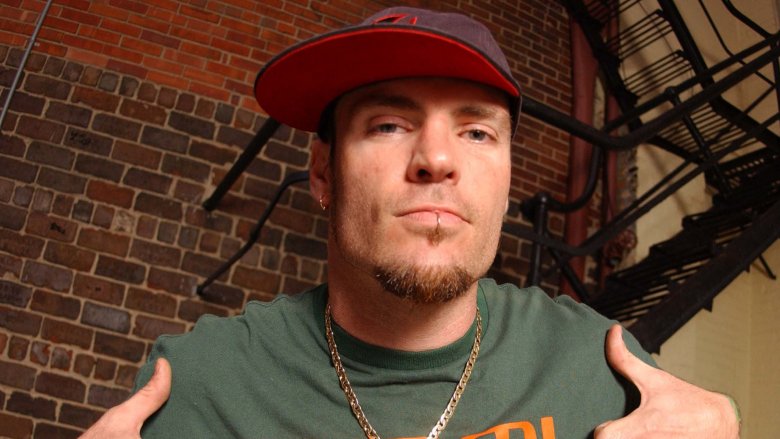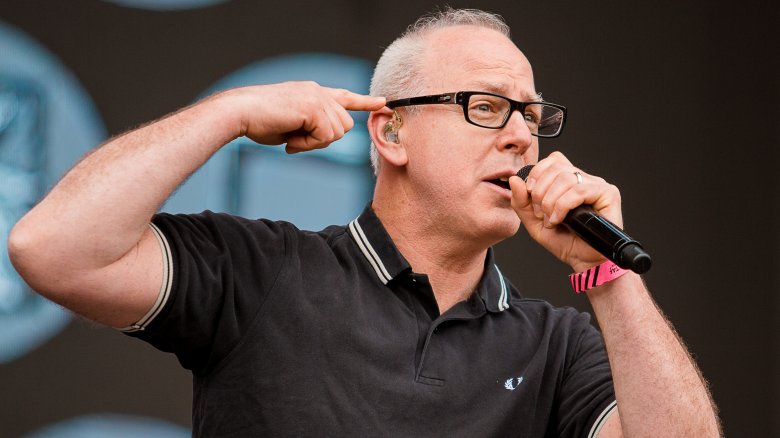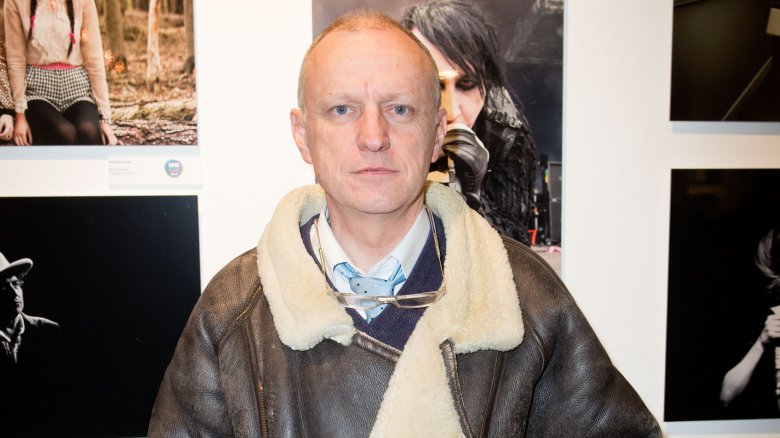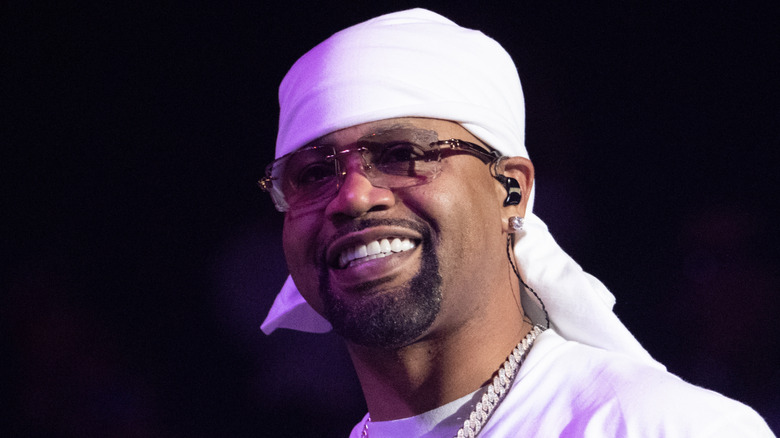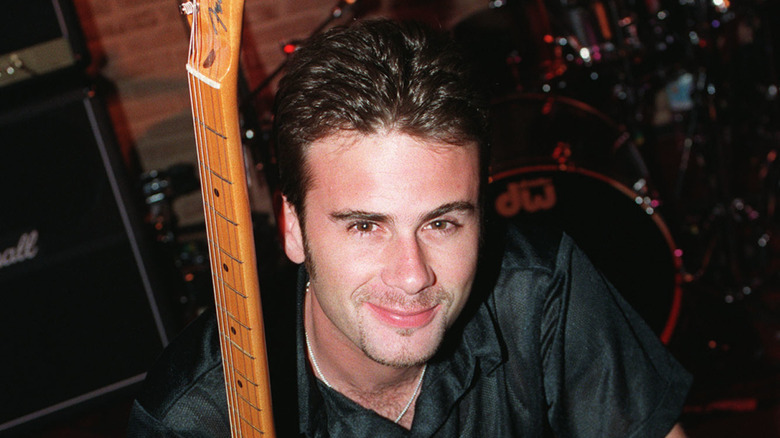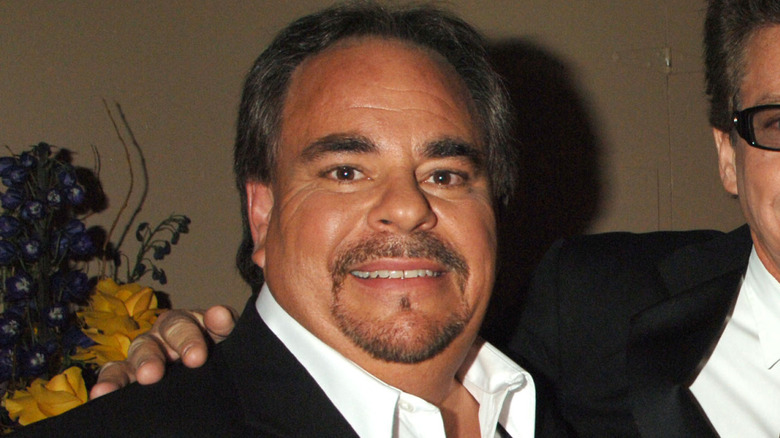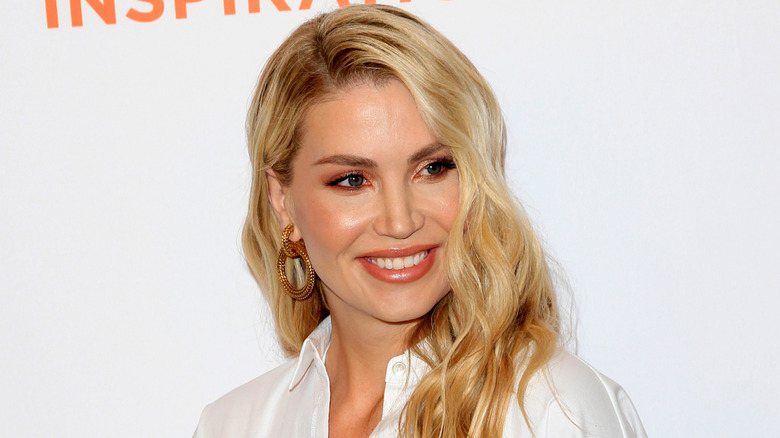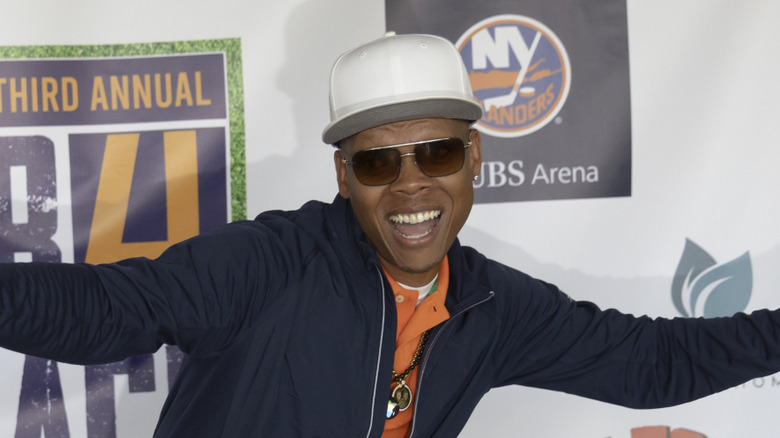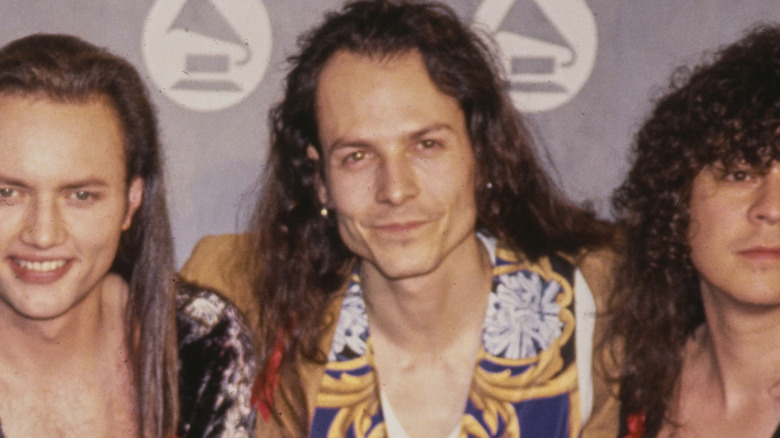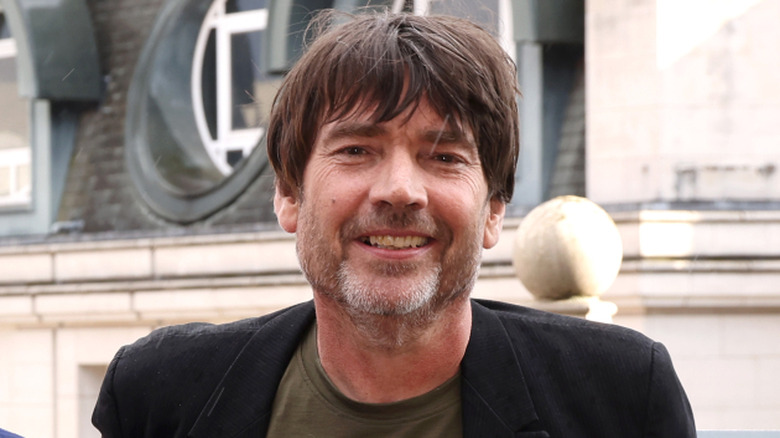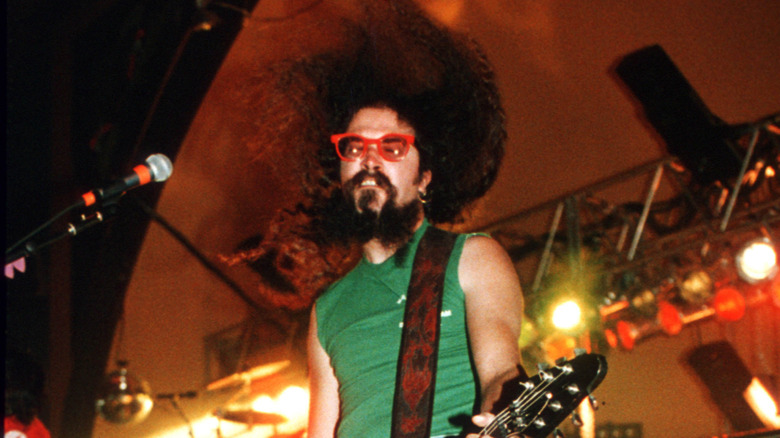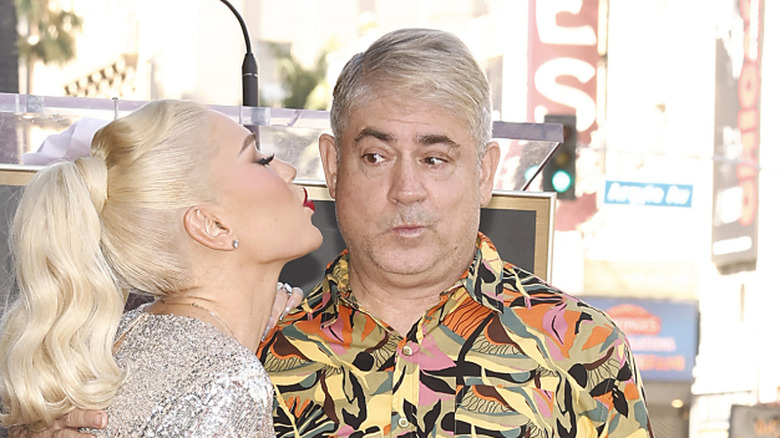Musicians Who Work Totally Normal Jobs Today
Imagine attending a life science course in college, and your professor is the same guy whose band you saw play last summer in a club. Or you're taking a tour of a stunning new home and discover it was built by a Jonas brother, or renovated by the guy who did "Ice Ice Baby" back in the early '90s. Or you turn on CNN one day and see that the guy with the handlebar mustache who is speaking quite knowledgeably about anti-terrorism policy was the same guy on the cover of that Doobie Brothers record your parents had way back when, the one with "What a Fool Believes" on it. Or you're on vacation in London and throw your back out, and the chiropractor who takes your emergency office visit used to play drums for the Clash.
All of the above things could conceivably happen because plenty of musicians or former musicians have given up the limelight for those types of day jobs, or work on their music as a side interest around their more staid new careers. Indeed, there are quite a few once-famous musicians who work totally normal jobs today.
Al Green
In 1974, Al Green was one of the most popular singers in the country. Hits like "Let's Stay Together," "Here I Am (Come and Take Me)," and "Love and Happiness" made him a household name, and virtually anything he wanted was his for the asking. But fame and fortune were not making him happy. He had already begun to revisit his Christian faith to find some meaning in it all. Then, on one tragic afternoon, Green was taking a bath when his girlfriend rushed into the bathroom and dumped scalding hot grits on him, leaving him severely burned, before she retreated to another room and died by suicide.
Green retreated partially from the limelight, becoming an ordained minister and releasing a handful of secular records before abandoning popular music in favor of gospel. While in the midst of this retreat, in December 1976, Green opened the Full Gospel Tabernacle church in Memphis, and he has preached there most Sundays ever since. Often, church members have to share pews with visitors who come in to see Green preach, simply because he's Al Green. "You might have come on your vacation — we get a lot of that," he told the Houston TV station KHOU. "Well, we say while you're here, why don't we do a little bit of 'Amazing Grace.' It may help you along your way."
If you or someone you know is struggling or in crisis, help is available. Call or text 988 or chat 988lifeline.org
Erykah Badu
Neo-soul songstress Erykah Badu has been a practicing doula since 2001, helping dozens of mothers deliver their babies either at home or in birthing rooms. A doula provides physical and emotional (though non-medical) support to mothers and their families during and after childbirth, letting them know what is happening throughout and assisting them in the decisions they make. Badu refers to her role as "the welcoming committee," helping usher new life into the world and being a calming presence for mothers. "I started studying on my own, different techniques, and the variables of what being a doula is about," she told Origin Magazine (via HuffPost). "I learned to originally be like water, in the place that I was, so that I could be a container for whatever they need. I love being of service in that way."
Badu estimates she has helped bring more than 40 babies into the world, and she keeps up with all of them; as she told radio personality Sway (via BDO), the children refer to her as their "Badoula." Badu also spends time in hospice centers, to sit at the bedsides of and provide comfort to those who are close to death, because "the main thing I want is for people's spirits to be at peace, whatever happens next."
David Kelly
In 1991, rapper Capital D, also known as Cap D, opened hip-hop shows for national acts like A Tribe Called Quest and Arrested Development. Later, he joined the hip-hop group All Natural, with whom he would record five albums, and in 2010, he made a solo album, "Polymath," that was acclaimed by the media. Nowadays, people might refer to the Chicagoan by his real name, David Kelly, who for 13 years was general counsel for the Golden State Warriors, before taking a position as the managing director and general counsel for the National Basketball Players Association (NBPA) in early 2025.
Kelly made the change from full-time rapper to part-time rapper/full-time University of Illinois law school student after getting married in 2000. After graduating, he joined a prestigious Chicago law firm and, two years after that, joined the Warriors.
"I always tried to be more thoughtful than your typical [rapper]," Kelly has said (via Above the Law). "Political stuff, racial issues, just the image people have of the Black man or Black people, I wanted to attack that. The image that Black people have of ourselves, I wanted to attack that." He still dabbles in rap, but these days it's more of a hobby, or a way to surprise new Warriors players who don't believe their general counsel can spit a verse, or that he once judged Eminem in a rap competition. Kelly says he has no regrets about his career — only he can probably tell you that in a rhyme.
Jeff 'Skunk' Baxter
In the '70s and '80s, Jeff "Skunk" Baxter was one of the most sought-after guitarists around, playing on countless recording sessions and incorporating his six-string magic into two of the era's biggest bands, Steely Dan and the Doobie Brothers. In the mid-'80s, the musician became fascinated with how similar music recording technology was to the technology guiding the United States' defense systems. "Radar," he told D'Angelico Guitars, "is just an electric guitar on steroids."
Baxter's neighbor, a retired engineer, got him interested in military-related publications, which turned into Baxter writing a paper on converting an existing military ship-to-air missile system into one for military defense. He didn't know it at the time, but his second career — as a defense consultant — had just begun.
"Most people start out in the military and then have a [civilian] career," Baxter said. "I did it the other way around; I started out with a great music career and then started doing things for the U.S. government." Baxter has, over time, expanded his knowledge into areas of counterterrorism and is regularly called upon to play the role of an enemy force (or "red team") in defense strategy war games. In these scenarios, he is known for his creativity and tactics that very closely resemble those in which enemies would engage. "I'm told I make a very good bad guy," he quipped.
Vanilla Ice
Few rappers rose to fame as quickly as Vanilla Ice did back in 1990, when his hit "Ice Ice Baby" was all over the radio and his album "To the Extreme" was No. 1 for four months. Few famous rappers have lost standing as quickly as Vanilla Ice did, though. Between acting (poorly) in his own movie, to his cameo in (and theme song for) a "Teenage Mutant Ninja Turtles" movie, to his follow-up album that yielded no hits and did not even chart, Ice fell hard and fell fast. At one point in the mid-'90s, he was left just dabbling in music while building a reputation as a competitive Jet Ski racer, before returning to the studio to make a rap/metal album aimed at the Limp Bizkit crowd. (It didn't work.)
Ice then did something remarkable. He took some of those "Ice Ice Baby" residuals and invested in real estate, becoming quite adept at buying properties, fixing them up, and reselling them at a higher value — commonly known as "flipping" the properties. To the surprise of just about everyone but Ice himself, he was really good at it. He became more or less a full-time real-estate mogul and a remodeling expert, creating his own company (Vanilla Ice Real Estate) and even starring in his own reality television series, "The Vanilla Ice Project," on the DIY network.
Greg Graffin
Growing up, Greg Graffin had what he once, in his book "Anarchy Evolution," called "a congenital distaste for authority." He rebelled against almost all forms of oversight, particularly those authority figures who he felt subscribed to dogmatic attitudes, were unwavering in their beliefs, and insistent that others take them as their own. Graffin's most immediate, visceral response to such figures can be found in his music — the insistent wall of sound he has made with his band Bad Religion for nearly 40 years. Through his lyrics, Graffin has spoken directly to audiences, providing them with food for thought and ammunition to use in arguments against those people and institutions that would hold them down.
Graffin is also a son of academics and an academic himself, holding a PhD in zoology from Cornell, and has acted as a lecturer in life sciences, paleontology, and evolution. He does not subscribe to any religion, nor does he consider himself an atheist. He instead argues that he is a naturalist. "Things we consider mysterious need not be attributed to a deity," he told the Denver Post. In a way, such beliefs are a continuation of a lifelong rebellion against authority, a questioning of what many consider settled matters.
Terry Chimes
Terry Chimes was a founding member of the great British punk band The Clash. He drummed on the band's universally acclaimed 1977 debut album, providing the rhythm and the propulsion for songs like "White Riot," "Career Opportunities," and "I'm So Bored with the U.S.A." He left after that record, but returned in 1982 to replace his replacement, Topper Headon (who was kicked out of the band because of drug misuse issues) and see the band through its greatest commercial moments — a Top 10 album ("Combat Rock") and single ("Rock the Casbah"), as well as a stadium tour opening for The Who during their first farewell. After leaving The Clash yet again, he drummed for bands as diverse as glam rockers Hanoi Rocks and metal icons Black Sabbath, before giving up music as a full-time occupation.
Instead, Chimes turned to health care, becoming a chiropractor in 1993 and, over time, establishing a chiropractic consultancy with a London clinic. Chimes is an outspoken advocate for overall health and wellness, giving lectures and supporting charities that are likewise inclined. (He was also chairman of the board for the YMCA of East London for many years.) "People say how can you prefer treating patients to being on stage in front of 100,000 people?" Chimes told the BBC. "But if you can get someone healthy, there's a satisfaction in that which is much more profound."
Dave Rowntree
In the mid-'90s, if you were a fan of British rock, you had to make a choice — Oasis or Blur? The two bands seemed to vie for the top of the charts more or less constantly. There was some great music being made between them, too, until Oasis broke up and the members of Blur spun off to do side projects, reuniting every few years to release new music (Their last studio album dropped in 2023). The band members' side projects were varied. Singer Damon Albarn, for example, formed the band Gorillaz and had more hits. Drummer Dave Rowntree went a different route: He became a computer animator and owner of his own animation company, flew planes, then went to law school and became a criminal lawyer.
That last occupational shift was particularly telling of his interests. While at one point serving as a temporary paralegal, he told Legal Week (via Above the Law) that he was fascinated by the trials he covered. "I've done some amazing things with Blur," he said, "but that, for me, was more interesting." He has served as a solicitor — one who, under British law, provides advice to clients, drafts documents, negotiates, and prepares cases for trial. In 2017, he was also elected to the county council in Norfolk, U.K., taking 59 percent of the vote, but stepped down in 2021. He then ran unsuccessfully to be the Member of Parliament for England's Mid Sussex district in 2024.
Bill Janovitz
With a sound right in the middle of jangly '80s college rock and the fuzzy, noisy grunge rock of the '90s, Buffalo Tom benefited from the alternative rock revolution. Formed in Boston by singer and guitarist Bill Janovitz, Buffalo Tom released six albums during its 1990s heyday and scored plenty of radio and MTV airplay with the 1993 hit "Sodajerk."
After 13 years of active recording, touring, and promotion with Buffalo Tom, Janovitz and his cohort decided to turn the band into a part-time affair in 1999. He still writes and records music, both with Buffalo Tom and on his own, but since 2001, he's devoted most of his professional energies to real estate. After making a name for himself as an agent with Coldwell Banker, Janovitz and a business partner formed the Hammond Residential agency in the western suburbs of Boston. Janovitz sold $50 million worth of homes annually, claiming to be half of the best-selling real-estate duo in Lexington, Massachusetts, before signing up with Compass in 2019, where he currently serves as vice president.
Juvenile
With his drawling, playful, and infectious tone, Juvenile became one of the definitive rappers of the millennium era. Popularizing the New Orleans hip-hop style, he sold more than 4 million copies of his album "400 Degrees," but is best known for the all-time party-starters of 1999's "Back That Azz Up" and "Slow Motion," which went all the way to No. 1 in 2004.
The musician born Terius Gray took some hiatuses in his career, but he never fully quit music, releasing the "Just Another Gangsta" LP in 2019. Juvenile's business and creative interests just lay elsewhere. In 2020, while homebound during COVID-19 lockdown measures, he found his passion for furniture and housewares and started a company called Made By Juvie. Demand for the rapper's light fixtures, tables, gun racks, chairs, beer taps, and other objects designed, built, and finished by Juvenile was so substantial that he had to cut off orders in 2024.
Jamie Walters
Jamie Walters could sing as well as act, and those skills, as well as his teen idol looks, landed him a major breakthrough in 1992, when he was cast as aspiring musician Alex O'Brien, lead singer of a garage band called The Heights on Fox's primetime soap "The Heights." The fake band's best song, "How Do You Talk to an Angel," was used as the theme song for the show, and it was recorded by studio musicians backing up Walters. It hit No. 1 on the pop chart days before "The Heights" was canceled. Two years later, Walters joined the cast of another teen show, "Beverly Hills, 90210," which bolstered his power ballad "Hold On" to the upper echelon of the pop chart.
After Walters' next single, "Why," failed to reach the Hot 100, the acting gigs became increasingly harder to come by. In 2002, Walters decided to quit music and TV to pursue his childhood dream job: firefighter and paramedic. "I love it. I work with a lot of great guys, and I get a lot of free time to hang out with my kids," Walters told Entertainment Weekly of his position in the Los Angeles City Fire Department.
Joey Scarbury
"The Greatest American Hero" ran for three moderately-watched seasons in the early 1980s, and the most memorable part of the superhero comedy was its theme song. "Believe It or Not (Theme from 'Greatest American Hero')," a No. 2 pop hit and No. 3 adult contemporary hit, was written by prolific television composer Mike Post and sung by Joey Scarbury, the latter having been plucked out of working obscurity as a session and backing vocalist.
Scarbury was enlisted to sing other mood-setting songs for "The Greatest American Hero," and two of them, "When She Dances" and "The River's Song," peaked in the low-middle of the pop and country charts, respectively, and by 1984, Scarbury's recording career had come to a quiet end. He at least walked away with an income source, however inconsistent. "I made the money back a hundredfold in residuals and royalties," he told Noblemania. "I'll go a year and make $3,000 and the next year tens of thousands."
Even a good year wouldn't provide Scarbury enough to live on in the modern United States, so his royalties became supplementary to his day jobs in car sales. "I was bored and sitting around doing nothing and a buddy of mine said come down and work for me and I did it," Scarbury said. After stints selling Hondas and Jeeps in Southern California, he was managing Lexus of Valencia by June 2013. In 2017, he left that venue to become a broker at an auto dealership company called True Blue Sales and Leasing.
David Lowery
David Lowery fronted the thoughtful and humorous college rock band Camper Van Beethoven throughout the 1980s, which built up a cult audience with original singles like "Take the Skinheads Bowling" and covers, such as its take on "Pictures of Matchstick Men." Immediately after breaking up the group in 1990, Lowery and guitarist Johnny Hickman started Cracker, which was all over rock radio in the coming years. Lowery's compositions rocked a little harder but kept up the lyrical agility, dark humor, and cleverness, as heard in the hits "Teen Angst," "Low," "I Hate My Generation," and "Get Off This."
There was always a wry, arch, and sardonically sociological bent to Lowery's music, so it seems like a natural progression that the rock star wound up in academia. In 2018, he earned a doctorate in higher education at the University of Georgia. Shortly thereafter, that institution added Lowery to the faculty of its Terry College of Business. Lowery is now a senior lecturer, teaching courses about the music industry.
Willa Ford
The teen pop era of the very late 1990s and early 2000s made superstars out of just a few performers, like Britney Spears and Christina Aguilera. Record labels pushed many other similar acts at the time, including Willa Ford. In 2001, Atlantic released what would be Ford's one and only album, "Willa Was Here," and promoted it with the single "I Wanna Be Bad." The song reached No. 22, but Ford would never make the pop chart again: Due to a series of circumstances far outside of her control, she'd be out of the music industry entirely within a couple of years. Her next single was released on September 11, 2001, and the public didn't notice owing to the tragic terrorist attacks that occurred on that day."Anything that launched that day kind of got canned," Ford told Billboard. Atlantic never released Ford's completed next record, and she never recorded another one either, attempting to move into acting with roles on "Raising Dad" and "Leverage," and modeling and posing for "Playboy."
Still wanting to make things and be artistic, Ford walked away from entertainment and followed her passion for interior design. "I'm just a creative human: if I'm not creating, I'm drying." She struck out on her own, founding and serving in the lead creative position at WFord Interiors, a home design firm.
Mark Arm
Mark Arm has been a crucial figure in the grunge rock scene since before the Seattle-based movement even had a name. In the mid-1980s, the singer and guitarist played in Green River, and after it broke up, some members created Pearl Jam, while Arm went on to front Mudhoney. Among the first grunge bands to find a national audience, Mudhoney's self-titled debut and "Every Good Boy Deserves Fudge" laid the groundwork for '90s alternative rock, particularly the singles "Touch Me I'm Sick" and "Suck You Dry."
Mudhoney's first two albums came out on Sub Pop, the one record label most associated with grunge. The small Seattle label remains an independent rock imprint into the 2020s, and Arm still works there. "In the early days, it was sort-of all hands on deck, like, if there were singles that needed to be stuffed, people who were in the bands in town would show up at the office space and stuff singles even if it wasn't their own band," Arm told KEXP's "Sound and Vision." After toiling at a comic book company's mail order fulfillment facility in the early 2000s, Arm joined Sub Pop doing the same thing, which he used to do on a volunteer basis in the '80s and '90s. Sub Pop still sells its catalog of recordings directly to the public through a mail order program, and Arm now manages the warehouse where all that happens.
Ronnie DeVoe
For most of the 1980s and well into the 1990s, Ronnie DeVoe was a member of two of the biggest R&B vocal groups of all time. First, he helped form New Edition, the bubblegum boy band responsible for "Candy Girl," "Cool it Now," and "Mr. Telephone Man." When that group fizzled out, he defected with Ricky Bell and Michael Bivins to form the new jack swing trio Bell Biv DeVoe, best known for "Poison" and "Do Me!"
While he still occasionally tours with one of his groups on the nostalgia circuit, DeVoe entered the workforce in 2002, acting as a real estate agent with a RE / MAX outlet in the Atlanta area. Within a few years, he was ready to set up his own companies, DeVoe Broker Associates and DeVoe Real Estate. In 2021, he wound up with another Atlanta agency, eXp Realty. He also traverses another performance circuit, speaking at conventions on the topics of fair housing and financial literacy.
Chris DeGarmo
Incorporating the hard rock and modern rock sounds of their Seattle contemporaries in the 1980s and 1990s with the free-wheeling vibes and storytelling elements of the 1970s, Queensryche hit it big. In its early years, it was largely the vehicle for the creative whims of founding guitarist Chris DeGarmo, who co-wrote the ambitious 1988 concept LP "Operation: Mindcrime" and took the lead on the band's massive, emotionally-driven 1991 hit single "Silent Lucidity."
By 1997, Queensryche's profile had dimmed somewhat, and DeGarmo felt that it was time to move on, both from his band and the music industry. He had a couple of kids, learned how to fly airplanes, got his pilot's license, and then found a job as a pilot with a private air travel service. While he occasionally makes music with his daughter, DeGarmo now primarily works in the business aviation industry, flying planes as needed for clients who don't want to travel on commercial airliners.
Alex James
The music scene of the 1990s in the United Kingdom was dominated by Britpop; bands that combined '60s rock hooks with contemporary alternative rock trappings. The biggest bands by far, and the ones who enjoyed prolonged success in the U.S., were Oasis and Blur. Bassist Alex James played on 10 Blur studio albums until the band went on a long hiatus in 2015.
James involved himself with a number of other pursuits. He started the Big Festival, wrote a book, and moved with his wife and five children to a 200-acre farm in Kingham, in Oxfordshire. It's not just some big plot of land; it's a working and active dairy farm where James gets the raw ingredients to make his eponymous line of artisan cheeses. Among the offerings available for purchase from Alex James in 2025: "Cheddar," "Goddess," "Glastonbury," and "Blue Monday." James became a cheesemaker while Blur was active, but the job is now his primary professional occupation. "All I think about is children and cheese these days," he told NME.
Jim Martin
A hard rock band with a sense of humor and flair for the weird, Faith No More rapidly veered between metal and alternative. Always present in the band's albums during the 1980s was the loud and shredding guitar work of original member Jim Martin, as heard on its first minor hit "We Care a Lot" and its sole actual hit, 1990's "Epic." Following the release of the band's fourth album, "Angel Dust," Martin exited Faith No More. "My departure from FNM in 1993 was controversial; I left while the band was still at the peak of its success," he told a fan site in 2012 (via Loudwire).
After quitting his band, Martin bought a large swath of land in Castro Valley, California, near where he grew up, and started farming the hilly, rural area. Martin grows two things: peas, on a subsistence basis, and pumpkins, for more commercial pursuits. His gourds are some of the biggest in the state and the country, and Martin has participated in numerous festivals, winning one in Santa Rosa, California, with a 1,087-pounder he grew on his small farm. "Sometimes when I have to go to work, I get mad because it takes time away from getting my hands dirty out here," he told the East Bay Times. Pumpkin farming occupies six months out of Martin's year; the rest is spent working in his family business, a property management company.
Eric Stefani
By the time No Doubt became one of the most popular pop bands around in 1996, it had been kicking around Southern California for a decade. Singer John Spence assembled the first incarnation of the band, asking Eric Stefani to play keyboards and Stefani's younger sister, Gwen, to be a second vocalist. Spence died in 1987, pushing Gwen Stefani to the forefront and Eric Stefani into the role of primary songwriter and arranger. He wrote most of the material on the band's self-titled 1992 debut, and contributed heavily to the major-label follow-up and commercial breakthrough, "Tragic Kingdom."
After a grueling, two-and-a-half-year recording process and not looking forward to endless touring, Eric Stefani left No Doubt just before it found fame and fortune. He didn't regret it, since he wanted to go after his first artistic passion. "I wanted to go back to drawing, and all the musical juices were sucked out of me at that point," he told the Los Angeles Times. "I was messed up inside. I was troubled. I didn't know what direction to go."
Having worked at animation houses sporadically on projects like "Mighty Mouse: The New Adventures," "A Pup Named Scooby-Doo," and two early '90s Bart Simpson music videos, Stefani chose that path. With experience in various production capacities for "The Simpsons" dating back to 1989, Stefani was hired onto that show as a staff artist and animator. He remained there until 1998, before taking a job in the animation department at "Rugrats."
